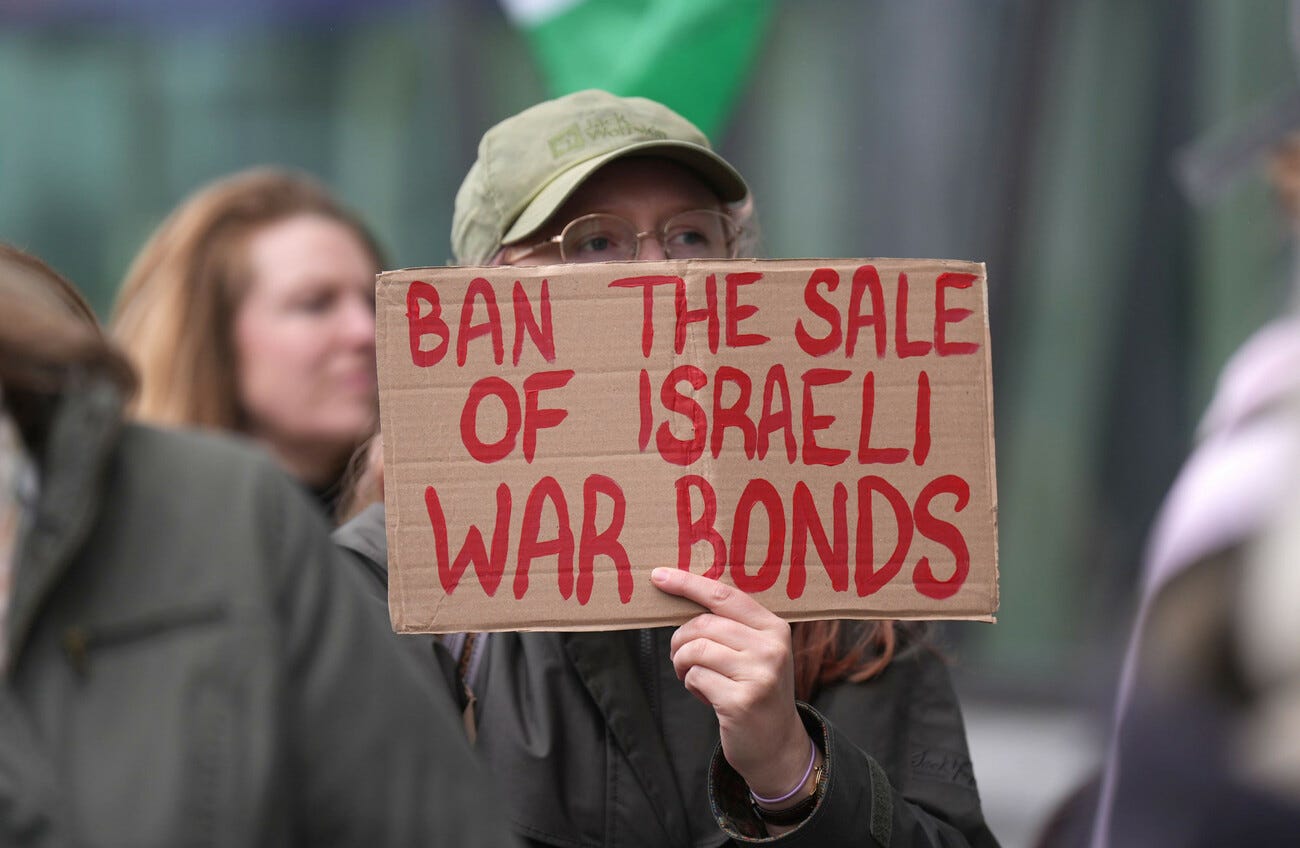Selling Israeli War Bonds Endorses Genocide
Irish Conservatives Block Proposal by Sinn Féin to Restrict Israeli “War Bonds”
On 28 May, representatives of conservative parties Fianna Fáil and Fine Gael, part of the current Irish government, voted down a proposal brought forward by Sinn Féin that would have granted the Minister for Finance the authority to restrict the sale of Israeli bonds. The bill was defeated by a margin of 87 to 75, despite support from opposition parties and independent parliamentarians who vote with the government on other issues.
The debate took place in the context of a broader campaign challenging the role of the Central Bank of Ireland (CBI) in facilitating the sale of Israeli bonds within European financial markets. Under EU law, such bonds cannot be circulated without approval from a central bank in the Union. Activists argue that the CBI’s approval of these bonds—which took place even after the beginning of Israel’s genocide in Gaza—makes Ireland complicit in violations of international law, despite statements by government officials expressing support for the Palestinian cause.
According to earlier reports, by the beginning of this year, Israel had raised nearly USD 19.5 billion through the sale of such bonds. Of this amount, close to USD 4.5 billion was raised with the help of major European players such as BNP Paribas and Deutsche Bank, which helped coordinate and recommend bond sales to investors. Israeli officials have made no effort to conceal the planned usage of the funds that were collected. “Israel doesn’t hide the purpose of these bonds,” Sinn Féin leader Mary Lou McDonald said ahead of the vote. “They emphasize, quote, ‘the crucial role of Israel bonds during this time of conflict and war.’ Israel openly invites people to invest in genocide.”
The actions of the government and the CBI greatly contrast with the will of the Irish public, which has demonstrated strong support for Palestine. “Allowing the Irish Central Bank to continue to deal in Israeli war bonds is an endorsement of genocide. It makes Ireland, in my view, complicit,” McDonald said in another statement. “It flies in the face of the ordinary people of Ireland who have marched, protested, campaigned and, with everything they have, stood up for the right of the Palestinians to live and live free.”
Widespread grassroots pressure and mass mobilizations has contributed to the country’s formal recognition of the State of Palestine in May 2024. Opposition parties argue that this public sentiment makes the gravity of the government’s inaction even worse.“There is something very perverse about saying to a people faced with genocide that you recognize them, that you stand with them, while at the same time playing a big part in funding the very weapons that are being used to slaughter their children,” McDonald noted.
Both the government and CBI leadership have argued that blocking the sale of Israeli bonds would be legally impossible. CBI head Gabriel Makhlouf defended the approval process, claiming that the bond prospectus in question met relevant criteria of “completeness, comprehensibility and consistency.” However, activists, including those from the Ireland Palestine Solidarity Campaign, have provided detailed evidence that Israel’s claims within the approval process obscure the bonds’ direct links to the genocide. The campaign also warned that CBI’s role in this matter represents a breach of both domestic and international law, including the Genocide Convention.
“Those who finance genocide under the mantra ‘it’s only business’ are complicit in genocide,” said David Landy of Jews for Palestine—Ireland. “By selling Israeli war bonds, the CBI is implicating all of us, all Irish people, in Israel’s war crimes.”





